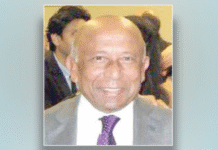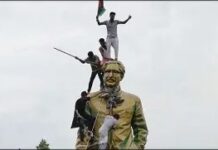Shahid Islam
Some dreadful, peach black patches of religious extremism are clouding the skies of Bangladesh. The hedonistic, arrogant and persistent negation of the incumbent AL regime that ‘there’s no ISIS in the country’ is now a reality none can shrug off as mere propaganda hyperbole. Even there are IS guys hiding inside the closets of some ruling party stalwarts, as has been discovered lately.
Especially the murder of 17 foreigners by a group of domestic extremists inside Dhaka’s Holey Artisan bakery and restaurant on July 1st night had uplifted Bangladesh’s war on terror to a new height. It had proved conclusively for the first time that the international extremist outfits like the IS and the al-Qaeda are very much active inside Bangladesh. And, they are capable of hitting any target any time. The dots are well connected.
Well trained and indoctrinated
The dead extremists found at the venue of the attack were missing from their families for months and years and attended training and indoctrination under the IS command, as the posting of their scarf-wrapped pictures in the IS-associated portal, SITE, showed.
Besides, the IS’s own mouthpiece, Amaq, had declared the Dhaka operation’s tentative date; posted picture of the operation’s commander soon after the siege of the Holey Artisan bakery’s compound, and; displayed pictures of the murdered foreigners as the slaughtering progressed throughout the night.
As well, maintenance of an uninterrupted, successful communi-cation channel of the hostage takers in Dhaka with the IS’s central command proved conclusively that the dogged assertiveness of the government about ‘there’s no IS in the country’ has been a lie that had made many law-enforcers lax about preparing contingency plans to tackle such eventualities, as the world witnessed.
It’s worth reminding that our investigation revealed long ago, and we had repeatedly stated in these pages, that the IS is not only there inside Bangladesh, according to one reliable source, the global militant outfit ‘is seated with its South Asia’s regional headquarters somewhere inside Bangladesh.’ This indeed is a dangerous and truly dreadful spectacle.
And this may be the reason why a famed Bangladeshi Nobel laureate, Dr. Mohammed Yunus, had urged global leaders through an electronically- dispatched message to resolve the global IS crisis first to prevent attacks like the one on Dhaka’s restaurant recurring anywhere.
Dr. Yunus aside, a deluge of opinion-making is splattering and waving across domestic and international mass media about how the attack took place in one of the most secured areas within Dhaka’s diplomatic enclave, and, who did it. Above all else, where’ll be the next attack and whether Bangladesh is prepared to tackle it effectively?
New recruits
The attackers are new IS recruits from wealthy urban families who are past their teen-aged mosses and had attended elite English medium schools in Dhaka. Two of them were students of elite private universities, the North-South and Brac, while only one another is madrassa – educated.
Such diverse antecedents of the attackers is indicative of the success the IS and other political Islamist groups had made in drawing support from frustrated Bangladeshi youths who are tired of the political squabbling springing from past history of this 45 years old, 160-million strong Muslim predominant country. This budding new generation had grown up seeing and hearing slurs of inter-party fighting over how this country came into being and who’re its real heroes. No wonder the attackers lectured about honesty and faith to the 11 hostages released unhurt.
This scribe had learnt that the attackers had made some demands to the government which the government never passed on to the people. While that’s a given, the attackers had chosen a time, a place and the targets that only some well-informed master-planers could have thought of. As well, the victims having included a bunch of garment buyers from Italy and another pool of metro rail construction consultants and advisers from Japan, the attack killed many birds in one single shot. Simply put: They’ve hit the country’s international gateway to stop external collaborations of any sorts.
And, viewed from the tapestry laid out since such targeted killings began in 2013, the attackers are systematically killing and scaring those supportive of the incumbent government from within and outside.
Aim of attack
Their actions speak of their political aim. Of the victims killed so far by these home-grown militants—and the claims made recurrently by the IS of the operations being IS-assisted are bloggers, publishers, authors and foreign and domestic religious workers of non-Islamic faith. The murder earlier of a Japanese and an Italian citizen notwithstanding, the murder of an Indian, nine Italian and seven Japanese in the latest attack is demonstrative of the attackers’ desire to pounce upon the targets deemed as cooperative with the incumbent Bangladesh government. Make no mistake that Japan is Bangladesh’s number one development partner and aid provider.
The perspective derived from such a reality offers much of the clues why the fear of the IS is all pervading among the masses and, why even Rohan Imtiaz, son of a ruling AL leader of the Dhaka city, is involved in such an attack.
It’s unfortunate that Dr. Yunus had urged for global efforts to eliminate the prospect of such terror attacks without stating with specificity anything about how the problem should be addressed in Bangladesh; where the minorities of all hues – political and religious – are facing random persecutions, muffling and unlawful treatments from a political regime that clings onto power without being truly representative of the people.
Now the die is cast, or call it the genie being out of the bottle, and, it’s time that the greater interest of the country outweighs any other personal or collective prerogatives of any particular leader. Bangladesh faces the most potent challenge to its existence as a liberal, pluralistic democracy; a dream for which people had fought a war of liberation in 1971 and the word democracy had been inscribed as the first cardinal principle of governance in the country’s constitution.
Role of armed forces
Without delay, not only the country needs to open up its politics to all stakeholders and re-design the mode of governance by calling for a snap mid-term election, a standing operating procedure (SOP) must be devised by the armed forces to stay prepared to tackle more future attacks.
The armed forces must also build some effective capability that will enable them to launch military operations within hours, instead of allowing 12 long hours to the attackers, as was allowed to the Gulshan restaurant attackers, and, previously to the BDR mutineers in 2009. Resultantly, 57 military officers had lost their lives in 2009 and 22 innocent lives were lost this time, excluding the dead attackers.
The world is watching. Unless there are evidence that the government is moving both politically and militarily toward such directions to close the gaping vulnerabilities lurking within the existing system of governance and the ‘very troubling’ preparedness of the security forces to handle such threats quickly and effectively, very little or no international interactions can be expected in coming months. Let’s not allow a global perception of Bangladesh being a failed nation dig its roots and sprinkle adverse anecdotes. It’s true that some boys of Bangladesh are IS. In reality, they’re also much more.
Source: Weekly Holiday









